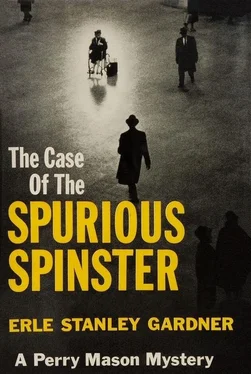“As soon as I reasoned that far, I knew all the answers.
“Lowry had told me he thought he could recognize the voice of the woman who had given him his instructions over the telephone and had acknowledged receipt of the money from time to time. That woman quite naturally would want him out of the way. Campbell talked to Lowry on the telephone. Lowry told him he had told me everything. Elizabeth Dow was sitting where she could hear Campbell’s end of the conversation — enough to know that Lowry had to be disposed of immediately.
“Quite naturally, she wanted to blame the crime on Sue Fisher. Everyone was casting Sue in the role of a crook and it was only natural for the finger of suspicion to point to her.
“So Elizabeth Dow hurried to a pay station, called Lowry and told him to come to Los Angeles at once, to go to a designated spot in Hollywood and wait for her if she wasn’t there when he arrived.
“Then the two women really hatched a diabolical plot. They got Sue to dress in a distinctive costume, to rent a car, put herself in an incriminating position and then return the car. Then Elizabeth Dow, dressed in the same distinctive costume, picked up her fellow-conspirator, who was posing as Miss Corning but who was going to have to disappear because Miss Corning’s sister was going to arrive. And, of course, her disappearance couldn’t look like flight. It had to have sinister overtones so that when the body of the real Amelia Corning was discovered that also would reflect back on Sue Fisher.
“As soon as the car Sue had rented was returned, they picked it up, met Lowry at the appointed place, drove him out to the place where they had planned his body to be found. Remember that Lowry was a loyal employee. He only knew Elizabeth Dow from her voice. He thought she was the head of the subsidiary he’d been working for. He would recognize her voice and follow her instructions to the letter.”
“Any guess what those instructions were?” Tragg asked.
“Only a guess,” Mason said. “But a pretty darn good guess.”
“What?”
“Well,” Mason said, “Elizabeth Dow probably told him that her companion was Amelia Corning, the owner of the company. That they had decided to destroy some of the books of the company and wanted him to witness the destruction. They said what had been done might have been wrong, so they were going to burn the books and put the money in as income and pay taxes on it.”
“That’s a guess?” Tragg asked.
“That’s a guess,” Mason said. “Make your own guess, if you don’t like it. Put yourself in Lowry’s position. He was in an automobile with the woman he felt was the big boss of the overall company, and, in addition, the woman who had been giving him instructions which he had been following faithfully all these months. He was going to do whatever they told him to do.”
“Which one killed him?” Tragg asked.
Mason shrugged his shoulders and said, “They were both in on it so it doesn’t make any difference. In all probability Elizabeth Dow was the one who struck the fatal blow with the letter opener — although I have an idea that when you put the pressure on them they’ll each try to blame the other and claim the murder came as a surprise. However, Elizabeth Dow was the one who had the most to lose because he could recognize her voice. She also was the stronger and more athletic.”
Tragg’s eyes narrowed. “If that is correct,” he said, “and if you surprised the murderers at the job, why didn’t they simply toss a match to the gasoline and burn up the evidence?”
“Because they didn’t want it burned up,” Mason said. “They wanted to make it appear plans had been made to burn up the evidence, but they wanted to be sure the gasoline-soaked body and books tied in with the gallon of gasoline Sue Fisher had bought at the service station.
“The whole thing had to be planned by someone who lived in the neighborhood, who knew the locality, who knew that the branch of the car agency would check out mileage on the rented car when it was returned and then leave it sitting at the back of the lot with the key in the lock. It had to be someone who lived in the neighborhood and it had to be someone who was a close friend of Elizabeth Dow. It’s like all those optical illusions — once you see them in their proper perspective you—”
Della Street came pushing forward and caught Mason’s eye.
At the expression on her face, the lawyer stopped in mid sentence.
“Amelia Corning is much, much better,” Della Street said. “The doctor has given her a stimulant which has brought her out of it. Her mind is razor-keen. She is asking for you and she’s very, very grateful.”
Tragg, giving Mason the benefit of his wry, one-sided smile, said, “All right, Counselor, now tell me: How did you manage to get that automobile plastered with fingerprints?”
“That,” Mason grinned, “is a trade secret. If Lowry’sfingerprints hadn’t been on that car I’d have given you a lot to think about... and now, if you’ll excuse us, we’re going to see Amelia Corning. I have an idea I’m laying the foundation for a very substantial fee.”












